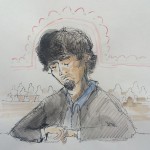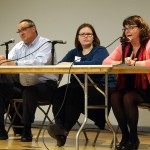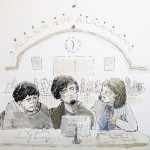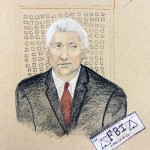The prosecution continued to call witnesses Wednesday at the John Joseph Moakley United States Courthouse in another emotionally charged day of testimony at the penalty phase of the trial of Dzhokhar Tsarnaev, the 21-year-old who, with his older brother Tamerlan, placed two bombs at the finish line of the 2013 Boston Marathon, killing three and injuring more than 260.
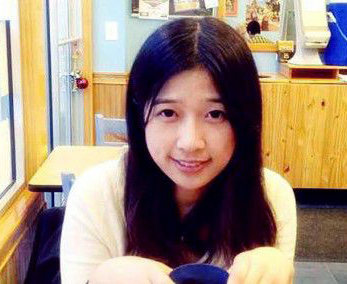
The morning’s testimony began with the focus on Sean Collier, the MIT police officer who was shot and killed by the Tsarnaev brothers on April 18, 2013, just three days after the bombings.
The brother of the deceased, Andrew Collier, was asked to tell anecdotes using family pictures that depicted the deceased looking happy, lively and jovial. He said the atmosphere at family events has changed permanently with his brother’s death.
“It’s still a huge loss, even after two years,” he said. “It’s something that will affect me and my family for the rest of our lives. Even when we’re having fun, there’s always a cloud over our event.”
The second witness of the day was Joe Rogers, Sean Collier’s stepfather, who explained the trauma that his large, tight-knit family had experienced as a result of Collier’s murder. He described their visit to Massachusetts General Hospital, where they encountered the heavy reality of Collier’s death.
“The Chief of Police came in and told us that he was dead,” he said. “He had a hole in the middle of his head. He was shot to pieces. They don’t really clean them up much. They just wipe off the blood. My wife was touching him, and his blood was coming off on her hands.”
Rogers said the experience destroyed his family’s health.
“I never saw a group of people that upset. Everybody has been affected. My wife has been diagnosed with PTSD,” he said. “She tried to go back to work a couple of times, but she hasn’t really been able to. It took her a couple months just to get out of bed. Each of the children have been affected. Some of them have been diagnosed as depressed. Some of them refuse to talk about it.”
Collier’s boss, John DiFava, Chief of Police at the Massachusetts Institute of Technology, was next to testify, and described Collier as a police officer of “perfect” quality.
“I’ve seen a lot of police officers, and I have to tell you, Sean was the very best,” DiFava said.
“It wasn’t the badge or the suit,” he said. “It was the character that made him a police officer. The strength of his character made him a great cop. He engaged professors, which is hard to do. He engaged staff. He engaged students. He was the real deal.”
DiFava said Sean’s steadfast character made him exemplary.
“If he had an opinion and he felt grounded in that opinion, he would stick to it,” DiFava said. “And the police officers in the room can describe how hard peer pressure can be in a police environment.”
DiFava, who has served for 30 years in Boston area police forces, said Sean’s death has fundamentally altered his view of police service.
“Sometimes I wonder if I want to continue work as a police administrator. Policing is the only thing I’ve ever done. And I have two children at home, and I always thought I would be proud if they wore the uniform,” he paused. “Now I’m not so sure.”
The next two witnesses were spectators of the marathon who had been injured in the bombings.
Eric Whalley, of England, attended the Marathon with his wife and sustained injuries from the Boylston Street blasts. Whalley has lost vision in his left eye because of projectile shrapnel, but said he was “pleased” that they were in Boston, where prompt medical attention allowed him to keep his eye, as well as his legs, which have also sustained permanent damage.
Some shrapnel, including the ball bearing that penetrated Whalley’s eye, is still lodged in his brain.
“They deemed it too risky to remove,” he said. “I still have quite a lot of shrapnel in both legs. They will eventually work out to the surface, but I am looking into soon having three in particular removed.”
He and his wife, both athletic people who enjoyed frequent long walks together, have significantly impaired ranges of mobility even two years after the incident. Both have dealt with approximately 20 surgeries each, hospital stays of over a month and ceramic implants to replace lost bones in the heels and feet. Whalley said he fears that amputation of his hurt leg remains a potential necessity in the future.
After the blasts hit, Eric and Ann Whalley were taken to separate hospitals, where each had assumed the other was dead. Telling this anecdote, Whalley became animated, scratching his head, shifting anxiously and turning red. Their sons had found that the two were alive, and arranged for them to be reunited in a hospital room as they recuperated.
“She thought I was dead, and I thought she was dead. I had been heavily sedated. When she was wheeled in, and we were side by side, I just grabbed her arm, and that was when we both realized that we were both alive and well,” he said.
Adrianne Haslet-Davis and her husband were also separated after being critically injured at the Marathon finish line.
“I remember hearing a loud bomb go off behind us, and I remember grabbing my husband, and saying ‘the next one’s going to hit, the next one’s going to hit,” she said.
Haslet-Davis, a ballroom dancer, lost her left foot in the blast and now wears a prosthesis. She became emotional as she was shown photos of the aftermath of the blasts, taken from a nearby restaurant’s surveillance camera.
“I saw all five of my toes, but I saw a lot of blood, but I didn’t see any ankle. I had only one shoe,” she said. “Someone took off my husband’s shoe, and his artery was spurting out blood, and his face kept getting whiter and whiter. His eyes were rolling into the back of his head. I thought he was dying. I thought I was dying. I started begging for whiskey because I only wanted the pain to stop.”
Haslet-Davis’ husband is awaiting a second skin grafting treatment for his damaged foot and has since checked himself into a mental facility for trauma.
Next to testify was Gary Oliveira, Deputy U.S. Marshal with the U.S. Marshal service, who was on duty watching the security cameras the day that the defendant was moved to Moakley courthouse, where the trial is taking place. In a snapshot from security camera footage, Tsarnaev raises his middle finger to the lens in the room’s corner, after possibly using its reflective encasement to fix his hair for about 45 seconds.
When court reconvened after a lunch break, the prosecution invited Jinyan Zhao, a surrogate aunt to deceased BU graduate student Lu Lingzi, to take the stand.
Lingzi was one of the three killed as a result of the 2013 Marathon bombings. The prosecution established Zhao as an Aunt-type figure to Lingzi. Zhao identified Lingzi as her niece, and in retellings of stories and anecdotes, she recalls Lingzi calling her “Aunty.”
Zhao described Lu’s home experience prior to moving to Boston in August 2012.
“She lived with her parents and her mother’s side parents,” Zhao said. “Three generations lived together. Their case is actually very special. They are very close. Since she was born they lived together.”
Zhao had visited the family’s home in Shenyang, China a few times. Relatives all pitched in to provide for Lingzi’s education and journey to the United States. Her family had difficulty letting Lingzi come so far, but they desired her happiness pursuing whatever she wanted.
Throughout her testimony, Zhao reminisced about Lingzi’s sweet tooth and love of food. When thinking and retelling the stories, she giggled at the mention of Lu’s eating abilities.
“She discovered whipped cream one time,” Zhao said. “I was making pancakes. Whipped cream goes with pancakes right? She sat there eating the whipped cream without the pancakes.”
Zhao recalled Lingzi’s discipline and scholarly behavior as a student. She mentioned Lingzi woke up every morning at the same time, even when on vacation from school. When glancing at Lingzi’s notes, they resembled a textbook’s print, Zhao said.
The last time Zhao spoke to Lingzi was the Friday before the bombing. After Lingzi’s body was found, the Boston Police contacted Zhao first. Lingzi’s parents flew into the city two days later. Lingzi’s mother and sister joined Zhao in finding the perfect burial dress. The group found a “perfect, pink, princess dress” in the outskirts of Boston in a bridal shop. The dress resembled what Lingzi’s mother had always imagined Lingzi would wear during her wedding, Zhao said.
“I think they decided after they arrived it was kind of chaos to me,” she said. “Ultimately her mom wanted her to be here because she just fell too short for her. She planned to stay here longer and make a life here. How she died and why she died. It feel like she was part of Boston, part of the city. She should be here.”
The prosecution presented a series of photos documenting Lingzi’s young adult life and travels as evidence. Among the photos, the jury viewed Lingzi in a classroom in China, on a sofa in Disney World wearing Minnie Mouse costume ears, and during a vacation in California.
The final piece of evidence presented to the jury was a video of Lu’s father speaking at her memorial at BU after her death. He spoke in Chinese, but the video was dubbed in English. Zhao confirmed the accuracy of the translation.

